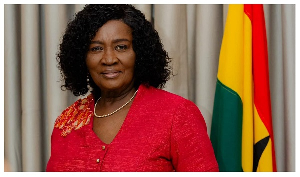INTRODUCTION
Much has been written about the way in which everything in Ghana is politicized. Of course, the habitual politicization of issues in Ghana is not merely a concocted perception but a veritable phenomenon with sometimes serious implications for development priorities and policy strategy. We are not however saying politics, in and of itself, is inevitably bad—far from it. Rather, it is the needless politicization of every strand of issue at the expense of strategic prioritization of national development dogmas that the corrective praxis of political and moral critique should seek to negate.
To a certain extent this praxis of critique seems to be missing from the spirit of the Constitution of the Fourth Republic, hence calls from various quarters for its revision to fit the challenging scope of democratic modernism and ideological inclusiveness. It may also be true that our uncritical domestication of some borrowed concepts of multiparty democracy from without has a lot to do with partisan politics. Here, by “partisan politics” we are referring to the overly politicization of national discourse without or limited consideration for the pragmatism of patriotism, of progressive nationalism.
However one may want to look at the complex of ideas underlying the unwholesomeness or divisive character of partisan politics, there is no doubt that the strategic constitutionalism of executive dominance has fed and continues to feed this muddled perception of political (mis)calculation in the Fourth Republic.
Executive dominance is an interesting concept though. The so-called Beijing Consensus provides a model political calculus of this phenomenon, as well. It also worked so well in the first few decades of the American Republic. Among other things, the concept helped usher in social-political cohesion, ideological solidarity, and national development at a measured pace commensurate with the driven collective psychology of political and moral leadership. Lest we are not misunderstood, we want to make it clear that executive dominance is morally acceptable if it derives from or is a function of popular will exercised through the elective franchise or parliamentary majority.
After all, at least in theory, marriage of the elective franchise and a patriotic national conscience makes for a semblance of moral pragmatism and effective management of a corporate body politic. It does also mean that democracy is not necessarily or always a productive expression of the popular will. It has been shown now and then that popular sovereignty can and does officially endorse incompetence at the polls or impose executive mandate on a wrong if unqualified political candidate. This is lost on many.
This may be due to the fact that multiparty democracy is not viewed the way a chameleon or amoeboid locomotion is designed. Unfortunately, popular sovereignty does not always succeed in staying in tune with this fickle character regarding the political geometry of popular expression as exercised via the elective franchise. The political arithmetic of multiparty democracy could be as flamboyantly Orwellian and predictively unpredictable as the mindless psychology of Darwinian evolution.
MULTIPARTY DEMOCRACY, CONSTITUTIONALISM, AND EXECUTIVE DOMINANCE
Still, there is so much about Ghana’s Constitution that needs revising to meet the political, economic, and moral deficits of the Fourth Republic. In Ghana, however, the Indemnity Clause finds itself entangled in a political gridlock within the tactical constitutional oversight of executive dominance. That is, the Clause reinforces the theory and praxis of executive immunity and provides a necessary if powerful alibi for executive dereliction and malfeasance. In both theory and practice this immunity extends to a particular sitting political fraternity, that is, incumbency, to which the executive belongs in a multiparty democracy. In this arrangement also the Opposition merely becomes an inconsequential appendage in the matrix of multiparty relations.
As a matter of fact the executive is too powerful, and unnecessarily so, insofar as its relative absolute autonomy in the discharge or exercise of its mandate and prerogatives. The benefits from the exercise of this mandate usually or rather disproportionally accrue to the executive’s party, financiers, and grassroots supporters. Therein lies the specter of executive conceit, of the political lopsidedness of the winner-takes-all executive dominance in the body politic of the Fourth Republic. However, unlike the patriotic character of the Nkrumah era, the Fourth Republic came into being imbued with the political personality of self-aggrandizement, group or ethnic solidarity, and sycophantic foolishness. This is characteristic of the present Opposition in which the specter of duopolistic ethnocentrism and ideological factionalism threaten its political viability and potentially undermines its mandate in respect of its proactive chaperonage of executive excesses.
While incumbency exhibits tolerance for ethnic diversity, the Opposition openly displays its hyperbolic addiction to political ethnocentrism and glorification of ethnic chauvinism. Those in the Opposition, of a certain ethnic personality, who refuse to register their sycophantic allegiance with or pander to its baldhead, scheming and Machiavellian leader, of a different ethnic personality, automatically become pariahs in a party that prides itself on tolerance for free expression or diversity of opinions. Yet for reasons of political convenience, these sanctimonious ethnic chauvinists who occupy privileged positions in the highest hierarchy of this ethnocentric political party shamelessly bring in brilliant technocrats from ethnic enclaves they despise to do their bidding.
These political adjutants strategically resort to prevarication in doing the bidding of their pay masters. Yet second-class citizenship as a function of vice-presidency is the niche reserved for these useful idiots, if there is even a vacant space in this niche at all for these slimy political opportunists. They are assigned political second-class citizenship in return for their agitational propaganda or agitprop intellectual obsequiousness in behalf of their less intellectually endowed ethnocentric pay masters. We see this in Danquah-Busia-Dombo, with sporadic elision or removal of Dombo from the tripartite name. In fact Dombo may have been appended to that terroristic duopoly as a convenient afterthought. This constitutes an excellent example of the politics of Machiavellian expediency.
Even so, the idea of scheming and Machiavellian pseudo-Nkrumahists like Freddie Blay and Akufo-Addo joining this ethnocentric political party adds to the evolving complex characterology of this ideologically parochial fraternity. This political fraternity, an institution known for its entrenched practice of ethnocentric duopoly, primarily of the Akyem and Asante ethnic stock, an elitist institution whose political antecedence is defined by a track record of terrorism, assassination attempts on Nkrumah, massacre of children and innocent men and women, unpatriotism, developmental Ludditism, personality clashes, clandestine collaborations with Western intelligence to destabilize Ghana, etc., under the leadership of Akufo-Addo has seen the human faces of internal dissension crushed under the guise of bringing discipline to the party and democratizing its constitutional structures.
This is far from the truth. There are those who are convinced that the scheming, dogmatic, and doctrinaire Akufo-Addo is cracking the whip of ideological totalitarianism using the party’s constitution to enforce ethno-partisan sycophancy and to impose Akyem ethnic supremacy on the party. If this is in fact true which it appears may be the case, it does not bode well for Ghana’s fledgling multiparty democracy.
THE SCOURGE OF PARTISAN POLITICS
This is not to say it is all rosy with incumbency. The spate of seeming corruption scandals, judgment debts, and alleged overpricing of national projects are, in and of themselves, great cause for concern. But incumbency works in collaboration with parliament, made up of members of the Opposition and members of the party to which the executive belongs, on these national projects and their corresponding budgeting constraints including pricing. This therefore implies that parliamentary corruption is necessarily a question of collective culpability in most instances, where Opposition members go along with the majority, only to go on radio and television and lambast incumbency for parliamentary corruption when instances of parliamentary corruption become public knowledge. The relative pervasiveness of judicial corruption further complicates the revolutionary politics of reform.
Ghanaians are integral part of this organized criminality of a pervasive national character, since they are the ones who periodically vote either of these two parties to public office to continue perpetrating bureaucratic criminality of every conceivable complexion on their behalf in a revolving door of impunity. In other words Ghanaians have themselves to blame for the poor state of affairs, for neither party has assumed the high office without the benefit of popular consent or through the barrel of the gun. Electoral imprimatur has always been the seal of direct access to the high office even if the process to that office is rigged. Yet it is Ghanaians themselves who can change the present social, moral, and political order. It is against this background that overly politicizing national problems such as political corruption inundates creative avenues to practical remediation strategies.
Those parliamentary opportunists who cite lack of adequate time allowable for serious parliamentary deliberations are the same who will resist passage of the Freedom of Information Bill (FOIB), choose the Ghana Hybrid System over Production Sharing Agreement, or refuse to even acknowledge the strategic importance of filibuster in the running ledger of parliamentary deliberation efforts. These ethnocentric political jihadists are the bane of Ghana’s development and social cohesion. They deploy equalization in the form of political capital when they are the government in power. Their political opponents, on the other hand, resort to pestering childish sensationalism and excessive politicization of issues when their perceived political leverage is consigned to a political tangent of numerical irrelevancy. It is public knowledge that schadenfreude politics rather than the politics of group solidarity and national development, has become the hallmark of Ghana’s multiparty democracy in the Fourth Republic. Partisan politics feeds schadenfreude politics.
Even more importantly, one resorts to property-owning democracy and the other to social democracy as defining contrasts of their unique political personalities. Yet both ideologies are no more than a mere political rhetoric synonymous with institutional kleptomania. None has effectively demonstrated that establishing such a political caliphate of Machiavellian deception, wicked lies, greed, and Orwellian materialism is impossible under their respective ideological melodies. Lack of meritocracy and sanctimonious sermonizing have become important tools for manipulating public psychology in running down Ghana. None has also demonstrated keenness for upholding national laws when such laws catch up with corrupt party officials.
This is because laws are by themselves useless without public knowledge of their existential power of assertiveness via fair and appropriate channels of enforcement. Deterrent and teachable precedents are therefore lost on that account. Partisan political pursuit and enforcement of transparency, probity, and accountability become a highly emotional rhetoric of boastful emptiness in electioneering and post-election politics. Ghanaians seem blind to these actualities. What is more, religion, blind faith in the clergy, and partisan executive flirtation with Ghana’s corrupt clergy compound the Ghanaian dilemma. The popularity of prosperity theology and the liberal manner Ghana’s corrupt clergy invokes the halo of divine grace as a preponderating counterweight to mortal corruptibility further immunizes public psychology against any creeping qualms of corruptibility.
We shall return…
Opinions of Sunday, 27 December 2015
Columnist: Kwarteng, Francis
The Scourge Of Partisan Politics 1
Entertainment













